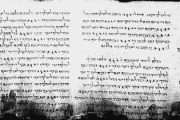Viewings: 5769

In the spring of 1947 in the areas of hirbet-Qumran in the North-West coast of the Dead sea has been a sensational event Bedouins from the tribe of tamira in one of the caves discovered two clay vessel with ancient manuscripts. The cave was located in 25 km to the East of Jerusalem and 3 km to the North from a known source ain Pasha.
Ancient texts were written on the skin, collapsed in the scrolls. Some of them were Packed in fabric, but still had the old look and turned mostly into a separate fragments of the once solid manuscripts. Some time scrolls did not raise interest from antique dealers Bethlehem and Jerusalem. In search of buyers Bedouins went to an Orthodox monastery. Mark in Jerusalem, where he sold part found manuscripts. The remaining part eventually acquired the Hebrew University in Jerusalem.
Consultants antiquities first announced scrolls found no scientific value. However, other researchers have questioned this and sent photocopies of some of the manuscripts known in those days the American semitology U. F. the Albright. The answer was not long in coming, and coming from American telegram was: "please Accept my heartfelt congratulations with the greatest discovery of our time - the discovery of prehistoric texts. I refer them to the first century BC!"
In the spring of 1948 on the scrolls learned in Europe, and around them began a real boom, because, as it turned out, they contained the sacred texts, shedding new light on the origins of Christianity. Not surprisingly, in hirbet-Qumran often visited different expedition, who for years have found in the mountain range in length 6-8 km about 40 caves, and to 1957, in 11 of them were new scrolls. Meanwhile, 4 manuscripts, bought from the Bedouins for nothing Orthodox monastery of St. Mark "left" in the US for 250 thousand dollars!
One of the dead sea scrolls
The first summarizing work on scrolls found was released in 1957 and Since then produced numerous books and articles on the Qumran manuscripts, conducted dozens of scientific conferences. In 1994 in St. Petersburg, publishing house of the Center of Oriental studies on the same topic published a book of biblical scholar I. the Tantlevsky "History and ideology of the Qumran community".
The renewal of excitement around the Qumran manuscripts for half a century is mainly due to the fact that they describe events, well-known to us from the Holy Christian books. This would not be anything special, if not for one circumstance, namely: Qumran sages describe them for a century and a half before the emergence of Christianity!
In the scrolls special attention is paid to the person of the Director of the Qumran community, called the Teacher of righteousness. His activity is defined I. Tantlevsky period 176-136 BCE His life reminds me the biography of Jesus Christ. For example, the head of the Qumranites acted as the prophet received a revelation from God, and came from a priestly family (mother line of Jesus, according to the Gospels, too, has ascended to the descendants of Aaron). The teacher of righteousness, like Jesus, was his "forerunner" predecessor in the running of the community. Just as John the Baptist, the Qumran "forerunner" urged the Israelis to come to the Judean desert for cleansing from sin and expected in the near future coming of the true prophet. The teacher of righteousness and appeared as the expected Messiah, the Anointed of God.
The Master's followers settled in Jerusalem and acted along with other religious and political groups and sects. In one of the scrolls says, "And the Man who by the power of the most high will update the law, you would be called a liar and, finally, will zamislite to kill him, not recognizing his greatness". Clash of the Teacher of righteousness, which claimed to be the Messiah, with the Jerusalem priesthood was inevitable. And, of course, was followed by punishment. What was it? The answer I. the Tantlevsky to this question differently as sensational not be called. In one of the manuscript says that the enemies "shall lay hands on the Messiah of Israel and "crucify him!" By I. Tantlevsky, this record was actually a statement of an accomplished fact! In another Qumran fragment mentioned even the nails with which they nailed him crucified. It turns out that even the decree of the Persian king Darius threatened criminals "nailing to the log." So the practice of crucifixion was used in Judah long before the arrival of the Romans.
Such facts are striking Parallels with the life of Jesus Christ is not exhausted. Upon the death of the Teacher of righteousness Qumranites advanced the idea of his SECOND coming at the "end of days" for vengeance on their enemies, and the salvation of the faithful followers! It is characteristic that their leader is the Qumranites called the Son of God. "He will heal the wounded and will raise the dead, - says one of the scrolls, - is to preach the gospel to the poor and saturate the weak, will lead rejected and will enrich the needy". According to the Gospels, John the Baptist has sent Jesus ' disciples, with the question: "art Thou He That should come, or do we look for Another?" It is not excluded that by this Other John meant the teacher of righteousness.
How to interpret such a remarkable coincidence in the biographies of the Teachers of the Qumranites and Jesus Christ? Of course, you can apply to the coincidences or General historical trends for both of time. Expressed another assumption. As you know, Jesus early in his epic spent some time in the Judean desert, where dwelt the Essenes-Qumranites. It is not excluded that the doctrine of the Qumranites was, as they say, accepted Christ into consideration and have influenced the formation of the Christian doctrine.
















